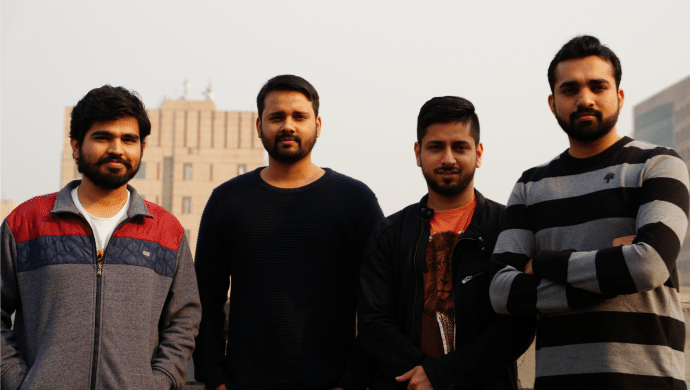Additionally, Fashin also has features like image- and text-based search, tag-based filtering, and real-time trend analysis from videos

(L-R) Staqu Co-founders Chetan Rexwal, Atul Rai, Pankaj Sharma, and Anurag Saini
How many times have we dreamt of dressing up exactly like our favourite Hollywood icon to impress our girlfriend/boyfriend? I’m sure many of us would have tried to be a Matt Damon or Leonardo DiCaprio when we were young, at least by emulating their dressing style.
Now, what if we are able to identify the exact piece of clothing of any actor while playing a movie or music video on our smartphone, with its prices and availability at e-commerce stores — all in real time? Sounds improbable?
Gurgaon-based Staqu Technologies is here to make this a reality. It has developed an Artificial Intelligence (AI)-powered app, called Fashin, that can find similar T-shirts/trousers/shoes that an actor is wearing in a particular movie, in a fraction of seconds.
“Fashin is a one-of-a-kind app that uses AI to extract fashion from a live video. In addition to this, Fashin also boasts features like real-time trend analysis from videos, along with old features such as image-based search and tag-based filtering,” Staqu Co-founder and CEO Atul Rai told e27.
How it works
It is simple. Download the app, in which you can see a number of videos posted in it. Play a video of your choice and click the green button on the bottom right side as the video plays. Fashin will then keep throwing you information on the clothing the actors are wearing in that particular movie. And when you click the green button, you get information on which e-commerce store the apparel can be bought, along with the prices.
“We are building the technological ecosystem using Deep Learning, in which if any data is fed (mostly images) into the system, it should be smart enough to extract the semantic relationship and be able to extract the relevant domain information,” he added.

The startup was founded in October 2015 by Rai, Anurag Saini, Chetan Rexwal, and Pankaj Sharma. The word ‘Staqu’ was derived from the terms ‘stacks’ and ‘queues’, two of the most fundamental data structures in software engineering.
The company currently works in B2B and B2B2C segments. As for B2B, it partners with e-commerce companies for visual search, similar product recommendation, complementary product recommendation, automated product description generation, and trend analysis.
On other other hand, for mobile makers, Staqu provides native-level apps as well as a cross-platform recommendation system, which assists the user in taking informed decision while performing any e-commerce related activity.
“We started with the single goal of creating one of the most advanced AI companies in India, catering to the needs of local audience by customising the solution as per their requirements,” Rai added.
Artificial intelligence powering back-end processes
To date, Staqu has partnered with almost a dozen e-commerce companies, including Myntra, Amazon, and Snapdeal. Most of the partnerships are in the B2B space where it has sub-licensed its AI-powered APIs for them to automate different backend processes.
“Apart from image search, along with recommendation and trend analysis, we are also providing automated tag generation technology to e-commerce partners which is very critical for text-based search. For example, if a user is going to an e-commerce store to buy a ‘red colour round neck full sleeve kurti’, he can retrieve the product only if the tags (‘red’, ’round neck’, ‘full sleeve’) are there in the database of the site. Otherwise, the query will not match and the customer will not get the clothing,” he explained.
According to Rai, e-commerce companies invest a lot of money and time to generate these tags. With Staqu’s API, these tags can be generated within seconds with human-level accuracy and with lower infrastructure and human cost. The APIs also assist the e-commerce partners in automating various tasks and also help them to improve the overall product experience, he said.
While the key focus is India as of now, Staqu is also nursing an ambition to expand overseas. “We already have started our expansion strategically to international market and started to collaborate with some companies international markets. Having said that, India is the market where we are having our main focus, we see a huge opportunity in India and are working towards moulding our technology for the Indian ecosystem,” he shared.
The company works mostly on a license-based model, wherein for all its services it charges some fixed amount of subscription fee from the partners, based on the plan.
As of today, Staqu employs 20 people.
Funding
In June last year, Staqu raised an undisclosed funding amount from Indian Angel Network for infrastructure development and hiring. On being asked about the company’s follow-on fundraise plans, Rai drew an analogy saying: “If data is the new oil, then India is going to be the new Saudi Arabia and Staqu is going to be the new refinery. We know that the things we are building will soon challenge various stereotypes in different domains. And to move with the same pace and freedom, we need to get keep the ownership longer in the company. While fundraise is crucial, it means diluting more equity of the co-founders.”
He concludes:
“Our main priority is to share the ownership with those who have some sort of understanding about the technology and the platform we are building. We followed the same strategy even in our seed round and are approaching further rounds of funding with the same approach.”
—-
The post Fashin is the Shazam for videos, it identifies clothes worn on-screen and where to buy them appeared first on e27.